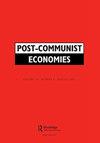Costs of economic growth: new insights on wealth and income inequalities in the post-communist countries
IF 1.8
3区 经济学
Q2 ECONOMICS
引用次数: 1
Abstract
ABSTRACT We scrutinise the role of institutional, market, and financial freedoms within the occurrence of wealth and income inequalities, thus attempting to corroborate the Kuznets curve hypothesis by using general and decomposed measures. To this end, we apply an auto-regressive fixed effect framework with Driscoll Kraay standard errors to analyse the panel time series data for twelve Post-Communist economies. Our empirical results highlight that the overall economic growth provides two different implications for the income and wealth inequalities. Economic growth fosters income inequality up to a threshold point, afterwards it declines with further economic growth, thereby validating the Kuznets curve hypothesis. The decomposed analysis confirms that further economic growth surpassing the threshold level re-distributes income from the top 10% class to the bottom 50% and middle 40% classes.经济增长的代价:对后共产主义国家财富和收入不平等的新见解
本文章由计算机程序翻译,如有差异,请以英文原文为准。
求助全文
约1分钟内获得全文
求助全文
来源期刊

Post-Communist Economies
ECONOMICS-
CiteScore
4.90
自引率
18.20%
发文量
21
期刊介绍:
Post-Communist Economies publishes key research and policy articles in the analysis of post-communist economies. The basic transformation in the past two decades through stabilisation, liberalisation and privatisation has been completed in virtually all of the former communist countries, but despite the dramatic changes that have taken place, the post-communist economies still form a clearly identifiable group, distinguished by the impact of the years of communist rule. Post-communist economies still present distinctive problems that make them a particular focus of research.
 求助内容:
求助内容: 应助结果提醒方式:
应助结果提醒方式:


